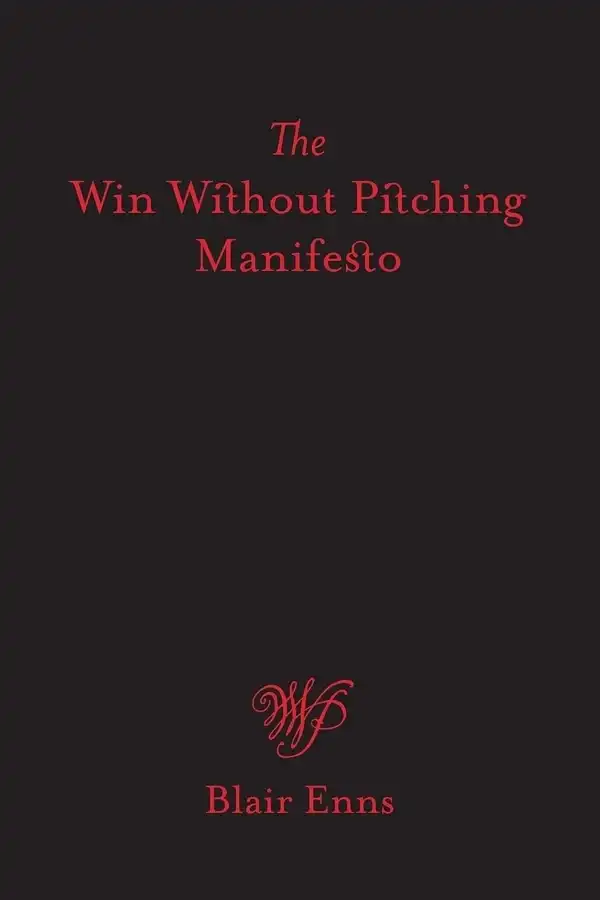←
Books

The Win Without Pitching Manifesto

Table of contents
Nothing yet!
Links to
Nothing yet!
Nothing yet!
Linked from
Nothing yet!
Highlights
- It is first through positioning our firm that we begin to shift the power in the buy-sell relationship and change the way our services are bought and sold.
- The good news is that there is no fun like making money, because financial strength affords us all kinds of options in our business and personal lives.
- Presenting is a tool of swaying, while conversing is a tool of weighing. Through the former we try to convince people to hire us. Through the latter we try to determine if both parties would be well served by working together.
- It is more likely that the client’s perspective will be wrong, or at least incomplete, than it is that it will be whole and accurate.
- The role of our thought leadership is to educate, not to persuade. The future client should be smarter for reading it, we should be smarter for writing it, and, one day, when the client does experience a problem in an area on which we’ve written, our guidance may be helpful to him in seeing the opportunity within his problem. Until that day, we continue to cement our position as leaders in our field through our writing. Experts write.
- Writing our way forward is a long-term approach that requires the patience of a farmer versus that of a hunter. But it is the only effective, respectful way with the client who says no and does not see the fit between his need and our expertise.
- Phased engagements, pilot projects, money-back guarantees and case studies framed in defined methodologies are among the many viable alternative forms of reassurance.
- Our default assumption should be that somebody always has the inside track. If we cannot Win Without Pitching, if we cannot derail the pitch, then we endeavor to be the one on the inside track.
- The document that we write is the contract. It serves as public verification of an agreement we have already formed with the client in conversation.
- The better clients, when they do recognize expertise, will crack open the façade of the proposal process and agree to a proper conversation.
- Doctors charge for MRIs. Accountants charge for audits. Lawyers charge for discovery. And we charge for our diagnostic work as well, whether it is a brand audit or discovery session that we conduct ourselves, or outside research that we commission.
- we must accept that our client base will turn over and we must understand that this churn is healthy.
- Clients hire us at times of need. We generally solve the most pressing problems at the beginning of our relationships, and over time the nature of our work slides toward the tactical end of our offering. Thus, our positioning with the client changes.
- The client’s experience in dealing with the selective expert versus the enthusiastic generalist who barges headlong into every opportunity is night and day different. One invites him to advance; the other causes him to retreat.
- When an opportunity first arises, therefore, we try to see if we can kill it.
- When we encounter an opportunity within our capabilities but outside of our expertise, we owe it to the client to tell him that, yes, we can do this, but no, it is not why we are typically hired.
- We must address our own negligence in standards around this behavior, and simply agree that there is a line that separates proving our ability to solve the client’s problem from actually solving his problem. We shall not be lured into crossing over this line before we are paid.
- We must dispossess ourselves of the notion that we can operate on thin profit margins at the beginning of a new client relationship and then work to increase those margins over time. We know that profit margin, like power, only diminishes with time.
- A key test remains to win while charging more. When we win by charging less, price becomes our positioning that we wear like an albatross with that client forever: we become the price shop.
- Superior service does not improve profit; profit improves service.
- The price we charge for such guidance should be enough that our clients feel compelled to act, lest they experience a profound sense of wasted resources.
- To charge John Doe Chevrolet what we would charge General Motors for the same work would be irresponsible of us. The larger client pays more to ensure his commitment to solving his problem and to ensure his commitment to working with us – and he pays more because we are delivering a service that has a greater dollar value to him.
- We will see ourselves as professional practitioners who bring real solutions to our clients’ business problems. We will seek respect above money, for only when we are respected as experts will we be paid the money we seek.
- When we express our resentment for the client who does not value us, we are really expressing our self-loathing for not being able to walk away from him.

Table of contents
Nothing yet!
Links to
Nothing yet!
Nothing yet!
Linked from
Nothing yet!